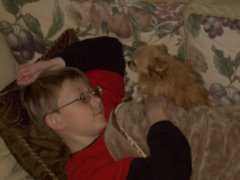On Tuesday, the class met at the Karl E. Mundt Library at the DSU campus. We were presented with the "how to's" for retrieving Literary Critique resources at our library as well as the databases and inter library loan specifics. I jumped up to get the Dictionary of Literary Biographies and I was not successful at finding it just by "winging" it. I had to get back to my laptop and write down the actual index information so I could locate it! Oh well, there are so many great books in there and I saw some new ones while I was lost, so that was a bonus.
Then, we met in our "Feminist Critique" group as all the other groups organized, too. We discussed the questions posted by Professor Hueners and decided upon PowerPoint to present our findings to the class. So, we split up the sample questions to get us going and then we thought that we could all try to develop another question which would be relevant to a Feminist Literary Critique. In class on Thursday, we'll move along with our PowerPoint and decide how our presentation will be organized...even looking for a good "feminist" song for background sound.
Discussion board for our Feminist Critique:
Message no. 227
Author: Deana Hueners (engl210_dh)
Date: Tuesday, February 27, 2007 9:44am
Feminism – concerns of gender, power
What types of roles do women have in the story? (Who is the most
feminine woman?)
What types of roles do men have in the story? (Who is the manliest man?)
Do any stereotypical characterizations appear in the story? (See your
responses to the above.)
What are the attitudes toward women held by the male characters in the
story?
What is a good man? What is a good woman?
How do male/female stereotypes and power structures influence what
happens in the story?
Message no. 229
Author: Amy Woolston (avwoolston)
Date: Wednesday, February 28, 2007 2:33pm
For our group project, we started by splitting up the suggested questions given by
Professor Hueners. I have question 3 and 4.
3. What types of roles do the men have in the story? (who is the manliest man?)
The father, Bailey, portrays a "family man"...organizer of the trip and provider for the
family. He was "the answer man", meaning the decisions came down to his final say;
"Bailey was looking straight ahead. His jaw was as rigid as a horseshoe. 'No,' he said."
With this answer about whether or not the family would stop to see the house with the
secret panel, he tries to put his foot down. But, the kids scream and yell in the car that
they wanted to stop and see this house. They whined to their mother (the kids) that they
never had any fun even on their vacation because they didn't get to do what they
wanted. Then, their dad gives in..."All right!' he shouted and drew the car to a stop at the
side of the road. 'Will you all shut up? Will you all just shut up for one second? If you
don't shut up, we won't go anywhere.'" He wasn't the manliest man, but he did his best to
guide the family and rule with fairness.
The son, John Wesley, was a boy with strong words and spunk. He seemed to speak his
mind; "Tennessee is just a hillbilly dumping ground," ... probably something he heard
from another child or even an adult!
There was a little African-American boy cited in the story, yet it doesn't delve into his
character beyond his "sighting".
Then, the Misfit. A leader of men, even if the followers he travelled with were just more
or less his young "henchmen", they are portrayed as pallbearers to a funeral....arriving
in a long, hearse like automobile...a clue of what's to come perhaps.
Back to the Misfit. He was wearing tan and white shoes with no socks....presumably the
shoes of one of his victims. He wore glasses and his hair was starting to grey. He spoke
with proper language....almost polite and concerned at first. "Lady,' the man said to the
children's mother, 'would you mind calling them children to sit down by you? Children
make me nervous. I want all you all to sit down right together there where you're at."
The Misfit commands every ones attention with his calm, stature and perhaps the fact that
he held a rifle. The Misfit is the manliest man, I think. At least, the one in control...and
the male with the longest life experience and organization enough to lead a jail break,
get a vehicle, clothes..and keep his partners-in-crime under control.
4. Do any stereotypical characterizations appear in the story?
Yes, I think the grandmother is stereotypical. Holding on to her beliefs about what
a "lady" behaves and looks like. The grandmother remains very concerned about
appearances and what other people think. She complains that she'd like to go
somewhere else on a road trip, yet she is the first one in the car the morning of the trip.
The mother of the children is stereotypical as well. She clearly takes care of everyone
but herself. She wears a scarf around her hair because she probably doesn't have the
time to tend to it. She is quiet and loving...in charge of many little tasks that keep the
family life going. The mother rarely speaks, and really shows very little emotion until she
watches her husband getting escorted into the woods....then she kind of "freaks."
Bailey, the father is a bit stereotypical, too. He was reading the sports section at the
kitchen table when he was introduced into the story. He speaks when he needs
to...probably everyone in the family knows his certain looks and what they mean, so
they just all do as is expected from him. He is their ring-master...he says what happens
and when...even if he does take some considerations for the others desires.
The kids are stereotypical as well. Active and vociferous...they say what comes to their
mind with no filtering...so refreshing and definitely stereotypical of children in general.
The Misfit was a stereotypical criminal. Believing he knew more than others and thinking
the belongings of others were just his...he just needed to "claim" them. The world is his
oyster...he takes and takes and takes...and gives nice little observations of what he
thinks life is. A stereotypical criminal might be kind of cocky...and a bit crazy. He is an
opportunist and behaves as though he has the ultimate knowledge needed to negotiate
the world around him. Only one basic problem, he's a murderer and a thief...with a
bankrupt soul.
Even the Mistfits two accomplices were stereotypical. Followers...taking orders from one
that could mold their thoughts and effect their actions...they seemed to be like soldiers
taking their orders from their "General" and are seemingly unaware that they are pawns
in The Misfits game.
Subscribe to:
Post Comments (Atom)



No comments:
Post a Comment